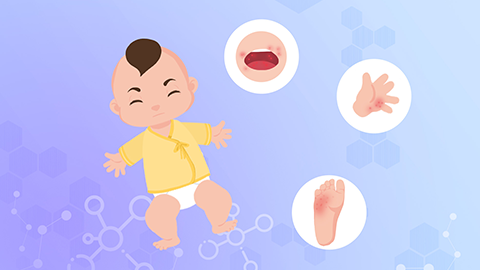What to do if a 1.5-year-old baby has a fever of 39°C
Generally speaking, fever refers to elevated body temperature. When a one-and-a-half-year-old child develops a fever reaching 39°C, it may be related to teething, acute tonsillitis, otitis media, acute bronchitis, hand-foot-and-mouth disease, or other factors. It is recommended to promptly implement general or medication treatments according to the underlying cause. If the condition cannot be controlled, timely medical consultation is advised. Detailed analysis is as follows:

1. Teething
During the teething process, babies may experience an inflammatory response that causes fever and elevates body temperature to 39°C. This may be accompanied by increased salivation and a tendency to bite objects. It is recommended to relieve symptoms by massaging the gums and moderately increasing water intake.
2. Acute Tonsillitis
Acute tonsillitis is caused by bacterial or viral infection. The inflammatory reaction can lead to high fever. The child may experience symptoms such as sore throat and difficulty swallowing. It is recommended to promptly follow medical advice to use medications such as amoxicillin granules, ibuprofen suspension, and Kehoujian Spray.
3. Otitis Media
Otitis media is usually associated with bacterial infection. Pathogenic bacteria may irritate the eardrum, leading to perforation and rupture, which can cause high fever. Symptoms may include ear pain and pus discharge. After diagnosis, treatment should follow a doctor's guidance regarding the use of medications such as levofloxacin hydrochloride ear drops, ofloxacin ear drops, or chloramphenicol ear drops.
4. Acute Bronchitis
Acute bronchitis is an inflammation of the trachea caused by viral or bacterial infection. If the inflammation isn't resolved, it may stimulate the body, causing persistent high fever. Symptoms typically include coughing and rapid breathing. A doctor may recommend medications such as ribavirin granules, acetaminophen oral solution, or azithromycin granules for treatment.
5. Hand-Foot-and-Mouth Disease
Hand-foot-and-mouth disease is associated with enterovirus infection. Before the virus is completely eliminated, the body may develop fever. This may even be accompanied by rashes or blisters on the hands, feet, mouth, and other areas. Under a doctor's recommendation, medications such as acyclovir cream, watermelon frost, or Pudi Lan Xiao Yan oral liquid may be used for treatment.
There are many possible causes of fever in infants, and timely treatment according to the underlying cause is important to avoid self-medication. Additionally, maintaining good dietary and hygiene habits during treatment can promote recovery.





